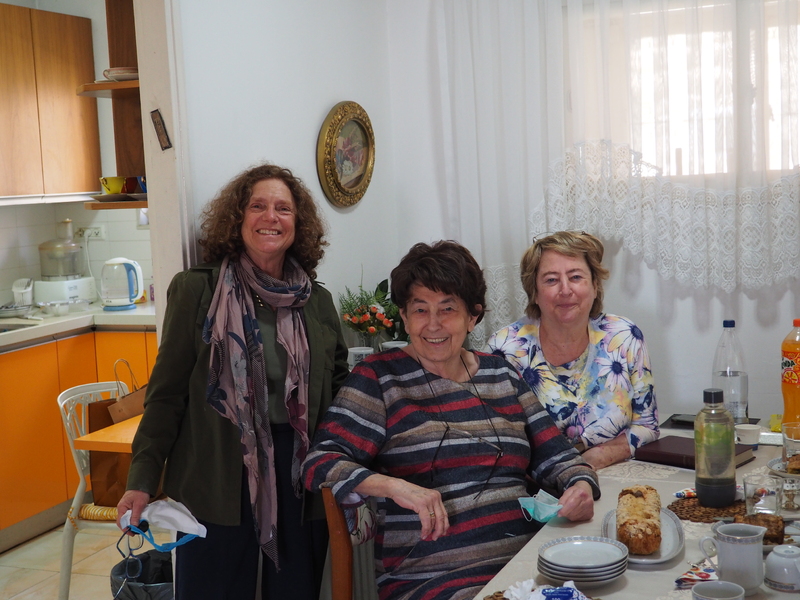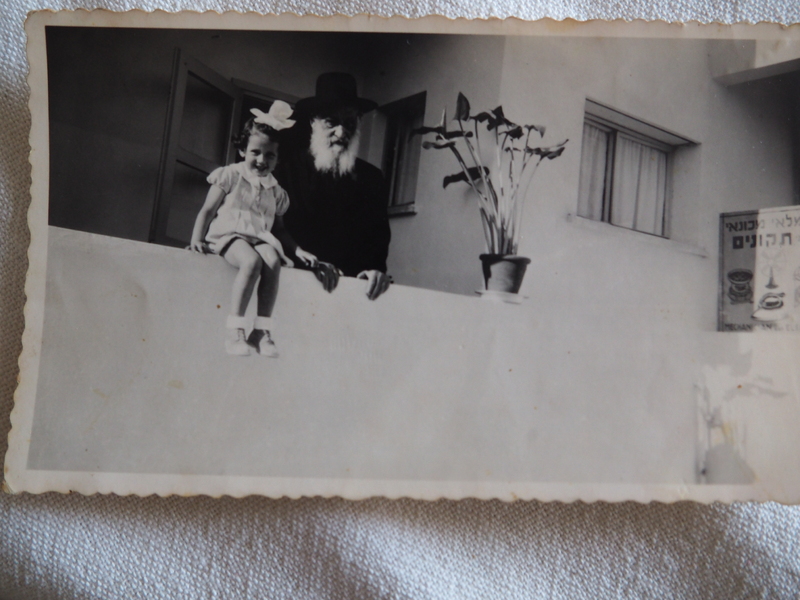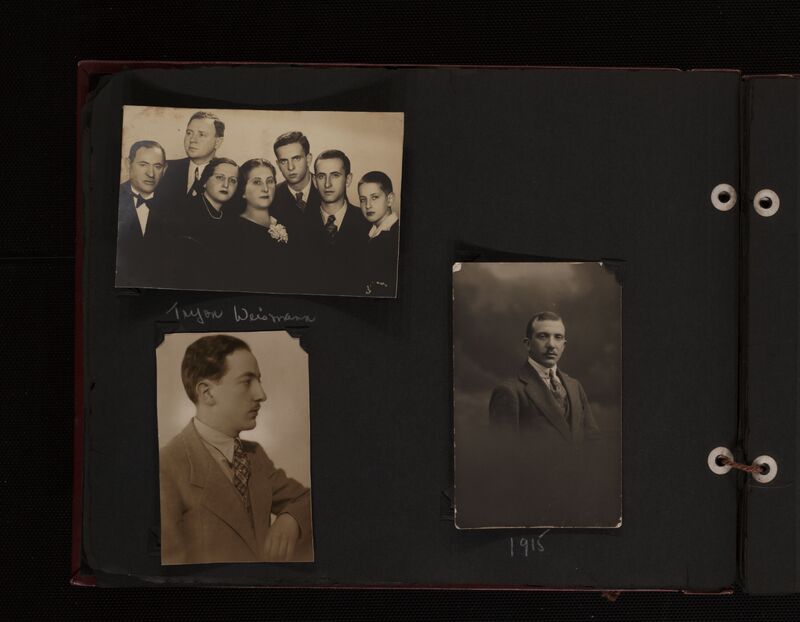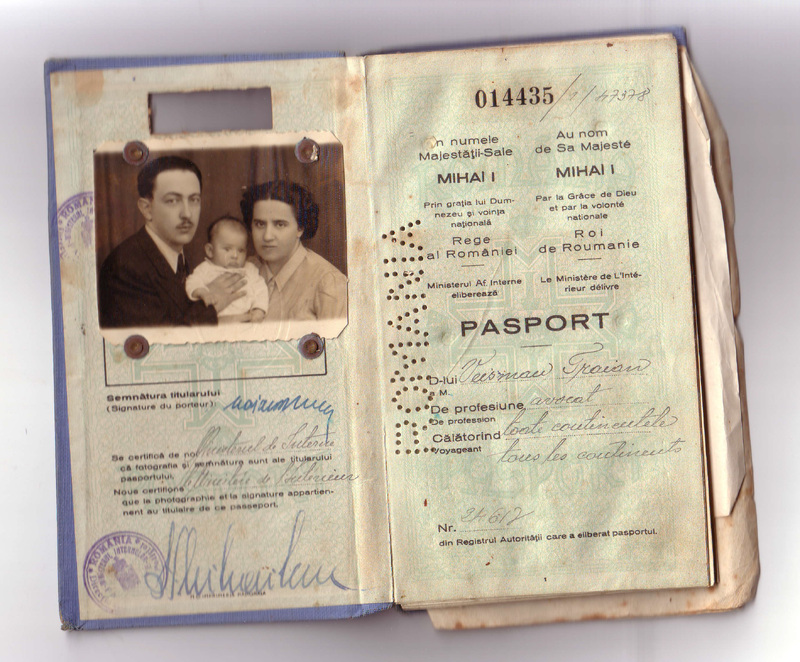Ziril's Story
Visiting Rachel and Nechemia in Jerusalem
When I arrived in Jerusalem, I found my way to Rachel and Nechemia’s apartment—barely finding a parking spot, walking past an ornate Judaica shop and finally finding their apartment, with the warm Mediterranean sun bright against the smooth Jerusalem stone walls. Rachel is a retired lawyer, her husband, Nechemia, a retired accountant. They have a large family and are observant Jews. I understand that of all of the cousins, Rachel’s father, Traian Chaim, was the only one who was orthodox.
Sammy and I sat with Rachel, Nechemia and Chanah, Rachel’s sister in Rachel’s cozy Jerusalem apartment. Right away, we were warmly welcomed to come sit for at the table for lunch to talk and share photos. It didn’t seem like Rachel knew anything more about the relatives in New York, with only the small memory of the beloved doll. As with all of the cousins, the connection between our families had been lost after they left Romania for Israel. When I asked how her family was able to survive during the Shoah, Rachel and Nechemia told their story.
Julia, Rachel and Chanah (behind Rachel); Looking closely you can see Rachel's amazing cheesecake waiting for us on the table.
Tziril's story
Ziril, Rachel’s mother, was from Iași Nechemia described how the Jews of Iași were taken by train to Călăraşi and Podul Iloaei. The trains went back and forth filling a mass grave, explained Nechemia and Rachel. Ziril’s father, brother and brother-in law (Rachel’s grandfather and uncles) were rounded up and put on the death trains and murdered. Ziril’s father was wearing a shirt with his name on it and somehow (Rachel explains below) he was found and buried in a private marked grave. Ziril fled to Bucharest and was married six months later to Traian Weisman (my great-grandmother's brother). Rachel gave me a photo of herself with her great-grandfather Yehushua Ghelber whose son and grandsons were murdered in the Iași pogrom.
In Rachel's words:
During the days of the pogrom - June 1941, the Jews were ordered to report to the local police station "Kestura" and prove that their stay in the city was legal and that they were not enemy subjects. The first ones who came forward were immediately released to their homes. Rachel's grandfather heard this and hurried to settle the matter and went to the police station with his younger brother Shalom Gelber, his only son Yosef Gelber and his only son-in-law Dov Barbash - the young husband of his daughter Sarah. Unfortunately none of them returned. Sarah remained a widow, childless, all her life. On the same train were also other relatives, among them the brothers Elimelech and Shlomo Reinhertz. Everyone was taken to the death train that traveled back and forth to Poduloi for 3 days, in closed carriages without a drop of water. In Poduloi they opened the train doors and removed the bodies. Few remained alive, among them - the Reinherts brothers who lay among the dead until dark. They rummaged through the bodies and had difficulty finding their uncle - the bodies were swollen from the heavy heat and it was impossible to recognize the face. In the end, he was identified by the embroidery of the name on his shirt and they arranged for him to be brought in a separate grave near the other victims in the Jewish cemetery of Poduloi. Haim Gelber's father - Yehoshua Gelber - Rachels great-grandfather arranged a tombstone with a detailed inscription. Rachel and Nehemiah visited there 57 years later and with great effort identified the tombstone. Elimelech Reinherts immigrated to Palestine with Rachel, her parents/ her grandmother Dvora Gelber'/aunt Sarah Barbash and lived in Tel Aviv. Brother Shlomo Reinharts immigrated only in 1972 when it became possible and lived in Jerusalem. The relationship with them was very close and even today - with their descendants. (Rachel Weisman Stern, December 21, 2022)
Rachel's father's (Traian) photographs from before the war were prominent in Paulina’s album. I have a photo of Traian taken when he lived in Piatra Neamt, in 1934 before the war. It seems like there were many connections between the Jewish families in Piatra Neamt and Iași, although they were some distance away, currently a two hour drive.
Traian and Ziril left Romania in 1951 when Rachel was five months old. They traveled by boat to Istanbul and then by train to Palestine.
Traian, Ziril and Rachel's Romanian Passport
Rachel describes their journey:
We boarded a rickety and dangerous ship to travel in the port of Constanţa on the Black Sea. The trip was supposed to last a few hours, but a Nazi captain threatened to sink our ship. After about 3 days and after paying bribes, we arrived in Istanbul, where we were greeted by representatives of the Jewish community who took care of our food. We entered the train and set off for a few days along the entire state of Turkey and crossed the border into Syria. The train stopped in the city of Chaleb and from there continued to Lebanon and crossed the border to Palestine in Ras al-Naqoura, a place known today as a border station with Lebanon, "Rosh Hanikra". What is surprising about the whole story is that then the laws of the British "White Paper" restricting the entry of Jewish immigrants were imposed on the territory of the British Mandate. Most of th Jewish immigrants were illegal. What has become clear in recent years is that the British allowed a line from Europe to enter the country, in secrecy, on the condition that they enter by land and not on the ships, some of which were sunk by the Nazis drowning all of the passengers and crew, and this made a bad impression on the world. As part of this, the road was opened by train



